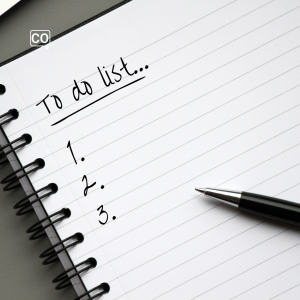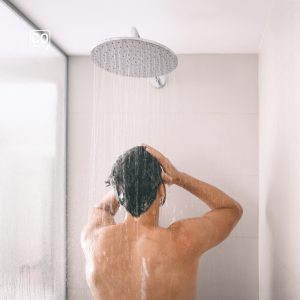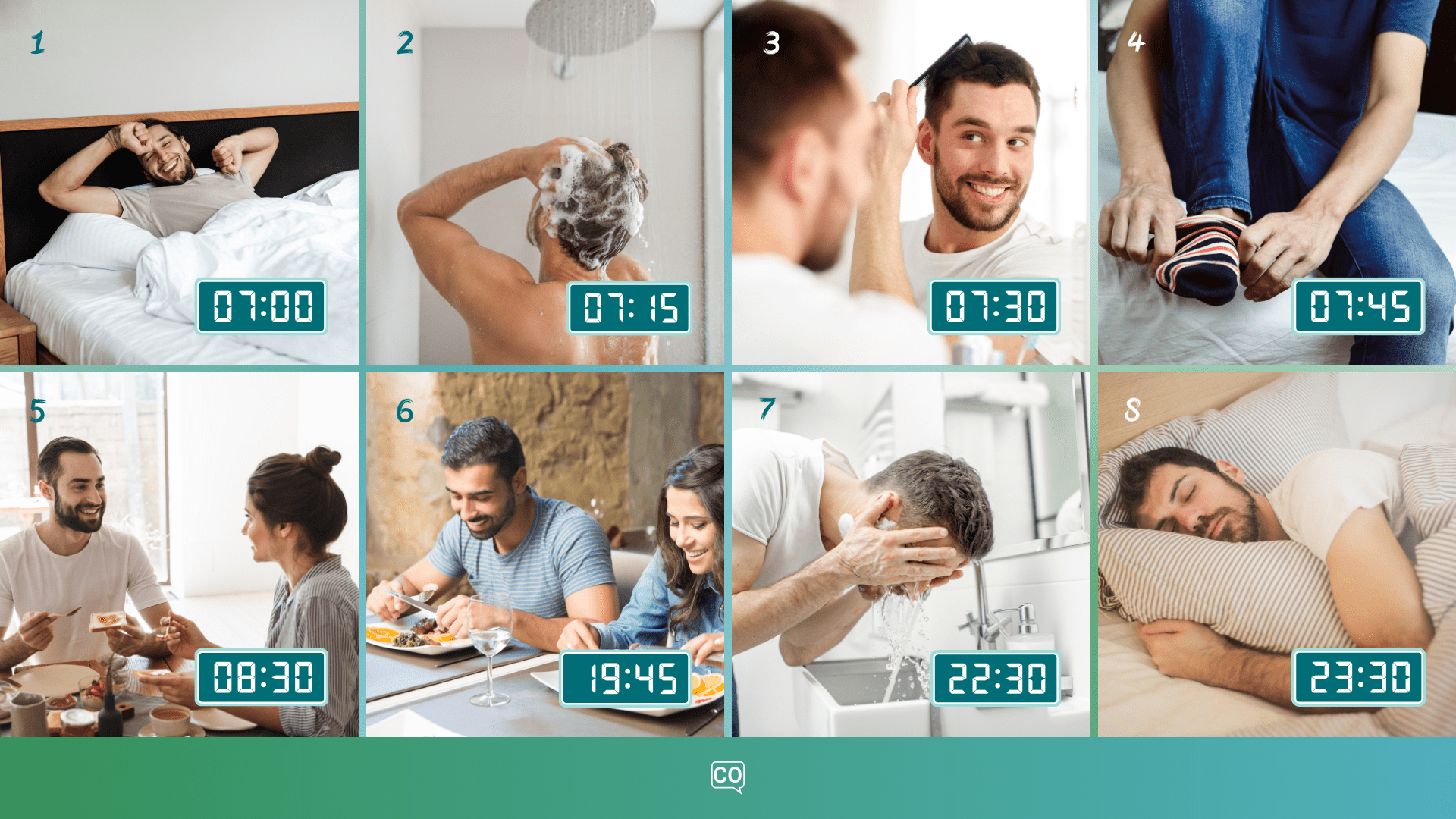Rutinas diarias
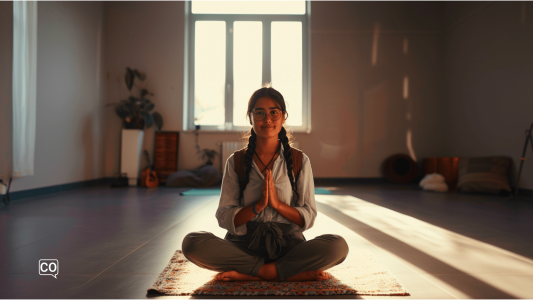
Learning goals:
- Hablar sobre la rutina diaria (Talk about daily routine)
- Actividades diarias (Daily activities)
- Verbos y pronombres reflexivos (Reflexive Verbs and Pronouns)
- Rutina diaria tradicional española (Traditional Spanish Daily Routine)
Learning module 3 (A1): Día a día (Day to day)
Recap exercises of the previous lesson
Teaching guidelines +/- 60 minutes
Core vocabulary (12)

Vosotros soñáis con abrir vuestro propio negocio.
(You all dream of opening your own business.)
Soñar
(To dream)

Ellos se lavan el cuerpo los fines de semana.
(They wash their bodies on weekends.)
Lavarse
(To wash oneself)

Tú te vistes con ropa elegante para la fiesta.
(You dress in smart clothes for the party.)
Vestirse
(To get dressed)
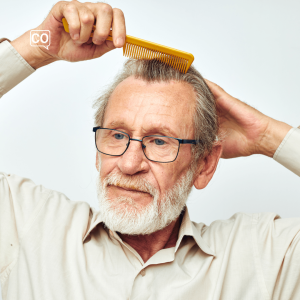
Nosotros nos peinamos juntos por la mañana.
(We brush our hair together in the morning.)
Peinarse
(To comb oneself)

Nosotros nos levantamos juntos los fines de semana.
(We get up together on the weekends.)
Levantarse
(To get up)

Tú desayunas cereal con leche.
(You have cereal with milk for breakfast.)
Desayunar
(To have breakfast)
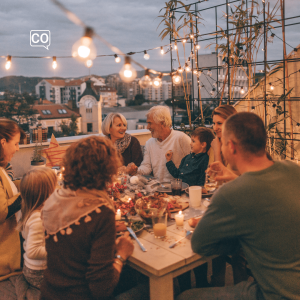
Ellos cenan en el restaurante italiano.
(They have dinner at the Italian restaurant.)
Cenar
(To dine)
Listening materials
Our listening materials implement the verbs, vocabulary and grammar topics of this lesson. Audio and video available!
A1.16.1 Diálogo: Las rutinas diarias
Spanish A1.16.1 Daily routines
Aprendemos sobre las rutinas diarias, como lavarse, ducharse, vestirse, acostarse, peinarse y levantarse.
(We learn about daily routines, like washing, showering, getting dressed, going to bed, combing your hair, and getting up.)
Teaching guidelines +/- 15 minutes
A1.16.2 Gramática: Verbos y pronombres reflexivos
Spanish A1.16.2 Reflexive Verbs and Pronouns
(Reflexive pronouns are used with reflexive verbs to indicate that the subject performs and receives the action.)
Teaching guidelines +/- 15 minutes
A1.16.3 Cuento corto: Ana se prepara para una entrevista de trabajo
Spanish A1.16.3 Ana prepares for a job interview.
Aprendemos sobre los verbos reflexivos que se utilizan en el día a día en un contexto común: una entrevista de trabajo.
(We learn about reflexive verbs that are used in daily life in a common context: a job interview.)
Teaching guidelines +/- 15 minutes
A1.16.4 Cultura: Rutina diaria tradicional española
Spanish A1.16.4 Traditional Spanish Daily Routine
Aprendemos sobre la rutina diaria tradicional de los españoles
(We learn about the traditional daily routine of Spaniards)
Teaching guidelines +/- 10 minutes
Exercises
These exercises can be done together during conversation lessons or as homework.
Exercise 1: Find the words
Instruction: Find the words, mark them and make sentences with the words.
Show answers Show hintsHints
To have breakfast , To comb oneself , To wash oneself , To get up , To sleep , To dine
Answers
Score: 0/6
| Levantarse | (To get up) |
| Peinarse | (To comb oneself) |
| Desayunar | (To have breakfast) |
| Dormir | (To sleep) |
| Lavarse | (To wash oneself) |
| Cenar | (To dine) |
Exercise 2: Reorder sentences
Instruction: The words in these sentences have been shuffled! Sort them so that they make a valid sentence again and translate.
Show answers Show translationExercise 3: Translate and make sentences
Instruction: Translate the words and phrases below and use it in a conversation or text.
Show answersExercise 4: Translate and use in a sentence
Instruction: Translate and say the word out loud. Use the word in a sentence.
Show translation|
1.
Vestirse
|
(To get dressed) |
|
2.
Cenar
|
(To dine) |
|
3.
Dormir
|
(To sleep) |
|
4.
Desayunar
|
(To have breakfast) |
|
5.
Lavarse
|
(To wash oneself) |
Exercise 5: Conjugación verbal
Instruction: Choose the correct word, read the sentence out loud and translate.
Show answers Show translationLevantarse (Presente, indicativo), Lavarse (Presente, indicativo)
1. Él ... antes de que salga el sol.
2. Ellos ... para ir al gimnasio.
3. Nosotros ... los pies después de caminar.
4. Ellos ... el cuerpo los fines de semana.
5. Yo ... los dientes todas las mañanas.
Exercise 6: Reflexive Verbs and Pronouns
Instruction: Choose the correct word, read the sentence out loud and translate.
Show answers Show translationnos levantamos, os laváis, nos duchamos, te vistes, me peino, se acuestan, te levantas, me lavo
1. Yo ... las manos.
2. Vosotros ... la cara.
3. Ellos ... a las diez de la noche.
4. Nosotros ... pronto.
5. Yo ... el pelo todas las mañanas.
6. Tú ... a las seis.
7. Nosotros ... después de hacer ejercicio.
8. Tú ... con ropa cómoda.
Exercise 7: Translate and make sentences
Instruction: Translate the words and phrases below and use it in a conversation or text.
Show answersConversation exercise
Teaching guidelines +/- 10 minutes
- Diga a qué hora hace Raúl qué actividad. (Tell at what hour Raul does what activity.)
Example phrases:
- A las 7:00 Raúl se despierta. (At 7:00 Raul wakes up.)
- ...
Appendix 1: Extended vocabulary table
Core vocabulary
(12):
Verbs: 12,
Context vocabulary:
4
| Spanish | English |
|---|---|
| Acostarse | To lie down |
| Cenar | To dine |
| Desayunar | To have breakfast |
| Despertarse | To wake up |
| Dormir | To sleep |
| Ducharse | To shower |
| Hacer | To do |
| Lavarse | To wash oneself |
| Levantarse | To get up |
| Peinarse | To comb oneself |
| Se acuesta | Goes to bed |
| Se cena | One has dinner |
| Se levanta | Gets up |
| Se viste | He gets dressed |
| Soñar | To dream |
| Vestirse | To get dressed |
Appendix 2: Verb conjugation tables for this lesson
Levantarse (to get up)
Exercises and examples phrases
- yo me levanto I get up
- tú te levantas You get up
- él/ella se levanta he gets up
- nosotros/nosotras nos levantamos We get up
- vosotros/vosotras os levantáis You all get up
- ellos/ellas se levantan They get up
Lavarse (to wash oneself)
Exercises and examples phrases
- yo me lavo I wash myself
- tú te lavas You wash yourself
- él/ella se lava he washes himself
- nosotros/nosotras nos lavamos we wash ourselves
- vosotros/vosotras os laváis You (plural) wash yourselves
- ellos/ellas se lavan They wash themselves
Exercise: Verb conjugation
Instruction: Choose the correct word, read the sentence out loud and translate.
Show answers Show translationLevantarse (Presente, indicativo), Lavarse (Presente, indicativo)
1. Él ... antes de que salga el sol.
2. Ellos ... para ir al gimnasio.
3. Nosotros ... los pies después de caminar.
4. Ellos ... el cuerpo los fines de semana.
5. Yo ... los dientes todas las mañanas.
